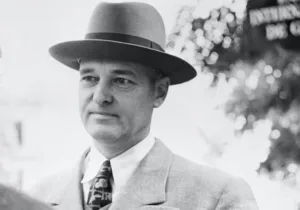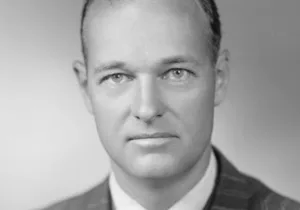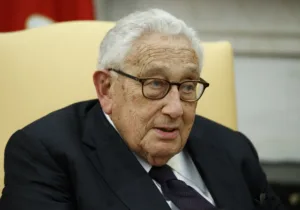This month marks the fiftieth anniversary of one of mankind’s—and America’s—greatest achievements: landing a man on the moon and bringing him home safely. In the midst of the Vietnam War and the struggle for civil rights and a decade scarred by assassinations, Apollo 11 reminded the world—and the American people—that America, while imperfect, is a great and good nation that can do great and good things. Oh, how we need to be re-reminded of this today, in this cynical age marked by deep distrust of our institutions, as our leaders label fellow Americans “evil” and use words to divide us and vow to “punish” their political “enemies,” as our narrowcast nation turns inward and focuses on its handhelds rather than the heavens.
Towering
Apollo 11 rocketed off the launch pad on July 16, 1969, landed on the moon on July 20, and returned home on July 24.
Astronauts Neil Armstrong, Buzz Aldrin, and Michael Collins made the historic journey. Armstrong and Aldrin would spend 21 hours, 38 minutes, 21 seconds on the lunar surface. The trio then sped home and splashed down in the Pacific. And a transfixed world watched it all. Perhaps more accurately and indeed more profoundly, America, in a daring expression of its openness, allowed the world to watch it all.
To get Armstrong, Aldrin, and Collins to the moon (the hard part) and back to earth safely (the harder part), America enlisted the talents some 300,000 people, spent the 2018 equivalent of $200 billion, constructed a rocket that stood taller than the Statue of Liberty and flew faster than 7,700 feet per second, and created new technologies and indeed entirely new fields of science.
Yet the Apollo program was not just a towering technological and scientific feat. It was an important statement of American foreign policy and a reflection of America’s liberal values. Seven years before Apollo 11, President John Kennedy had argued that America would either cede the heavens “to a hostile flag of conquest” or plant “a banner of freedom and peace” in space.
These geopolitical dimensions of the Apollo program can be glimpsed in the mission of Apollo 8, a crucial precursor to Apollo 11. Apollo 8 was transformed from a relatively simple earth-orbiting test flight into a daring six-day sprint to the moon because US reconnaissance satellites and CIA assets, as Apollo 8 astronaut Frank Borman recalls, “had information that the Soviets were planning on sending a man around the moon, in the year of 1968.”
With the Soviets plotting to beat the US into lunar orbit and land a cosmonaut on the moon soon thereafter, America’s policymakers ordered NASA to abandon the Apollo program’s carefully crafted timeline—what Apollo 8 astronaut Bill Anders calls an “inch-by-inch, one-step-at-a-time approach”—in favor of a Hail Mary audible. After Sputnik, Gagarin, and the Apollo 1 tragedy, Washington concluded that another second-place finish in the political-economic-industrial-military-technological struggle with the Soviets would be a devastating blow for America. They reckoned, rightly, that America needed to win the race to the moon to prove to a teetering world that communism wasn’t the inevitable wave of the future—that a system founded on individual liberty, self-government, free enterprise, and an open acknowledgment of the Creator could match and indeed best a system founded on centralized authority, top-down control, collectivism, and antitheism.
It’s often forgotten or at best footnoted that Apollo 8 marked the first time humans left the earth’s orbit. What must never be forgotten is what Borman, Anders, and Jim Lovell did as they entered lunar orbit on Christmas Eve, 1968. NASA instructed them to “say something appropriate” for the historic occasion. The entire world was listening. And thanks to the camerawork of Anders, the world was seeing itself in a new way—as a beautiful, albeit fragile, blue and green and white and tan marble, seemingly alone in the vast expanse of space.
Of course, the world was not and is not alone, as the men of Apollo 8 reminded us that Christmas Eve, with words that must have brought a smile to the Creator’s face:
In the beginning, God created the heaven and the earth. And the earth was without form, and void; and darkness was upon the face of the deep. And the Spirit of God moved upon the face of the waters. And God said, “Let there be light.” And there was light. And God saw the light, that it was good. And God divided the light from the darkness. And God called the light Day, and the darkness he called Night… And God said, “Let the waters under the heavens be gathered together unto one place, and let the dry land appear.” And it was so. And God called the dry land earth; and the gathering together of the waters He called the Seas. And God saw that it was good.
Borman closed with these poignant words: “Merry Christmas, and God bless all of you—all of you on the good earth.”
It’s unimaginable that a Soviet cosmonaut would have said something similar. We know he wouldn’t have been allowed to quote from the Bible or share a blessing or mention the Creator. For that matter, he wouldn’t have had any role in deciding what to say. A script would have been written by someone somewhere in the vast, faceless Soviet bureaucracy, and the cosmonaut would have been required to read from it. Just consider what Gagarin said after his return to earth: “I have completed this flight in the name of our Fatherland, in the name of the great Soviet people, and the Communist Party of the Soviet Union,” adding later, “I looked and looked, but I didn’t see God.”
The Apollo 8 crew, by contrast, looked upon creation and couldn’t help but see the Creator.
When Apollo 11 landed on the moon a few months later, Aldrin didn’t praise a president or political party; rather, he acknowledged that his journey and his life were dependent on his savior. He began by inviting “each person listening in, wherever and whomever he may be, to contemplate for a moment the events of the past few hours and to give thanks in his own individual way.” He then quietly quoted from John 15 and celebrated communion on another world, whispering, “I am the vine and you are the branches… Whoever remains in me, and I in him, will bear much fruit. For you can do nothing without me.”
It says something profound about America—whatever her faults—that when she sent her sons into the heavens, they pointed mankind toward the God of creation.
Worrisome
These stories about the Apollo program serve as helpful guideposts 50 years after Armstrong took his “small step” into history.
In a dramatic departure from the interest in and support for the space program Americans had in 1969, most Americans are oblivious to how much we depend on space for our needs today—communications, commerce, air travel, ground transport, emergency services. (Of the 1,300 functioning satellites orbiting earth, 568 are American. A Space Foundation report reveals a global space economy of more than $323 billion. More than 221,500 Americans work in the space sector. Non-government US space spending tops $32 billion annually.) And most Americans are oblivious to how much our enemies are threatening US interests and undermining international norms of behavior in space.
The Pentagon’s latest report on China notes that Beijing successfully launched 38 space vehicles in 2018 and “continues development of multiple counterspace capabilities designed to degrade and deny adversary use of space-based assets during a crisis or conflict.” A 2016 Pentagon report adds, “PLA writings emphasize the necessity of ‘destroying, damaging and interfering with the enemy’s reconnaissance…and communications satellites.’” Toward that end, China has conducted three highly reckless tests in space of anti-satellite weapons (ASATs).
Likewise, recent years have seen the Russian military test new ASATs, launch satellites capable of “rendezvous and proximity operations” (military parlance for maneuvering around other satellites in order to disrupt or disable them), and deploy 37 satellites on a single rocket.
The Russians and Chinese know that America’s military depends on space-based assets. Missile-defense warships prowling the Pacific; soldiers patrolling Afghanistan; unmanned combat aerial vehicles circling over Yemen and Somalia; fighter-bombers loitering over Syria; air squadrons and armored battalions protecting the Baltics; carrier strike groups defending freedom of navigation in the South China Sea; Navy taskforces and Marine expeditionary units keeping an eye on Iran in the Persian Gulf; submarines serving as a silent deterrent; sensors monitoring Russian, Chinese, and North Korean nukes; communications connecting commanders, troops, weapons systems, bases, and allies—all of these rely on space. “There is no soldier, sailor, airman, Marine, anywhere in the world that is not critically depending on what we provide in space,” explains Gen. John Hyten, commander of US Strategic Command.
These critical dependencies on our side and worrisome developments on the other side underscore why the president and Congress are moving forward, in bipartisan fashion, to stand up a military branch dedicated to keeping the peace in space. Some observers have panned the idea as a “Space Farce.” What the giggling pundits don’t know is that a military branch focused on defending America’s interests and assets in space is not a new idea—and is anything but a farce.
Space is more congested, more contested, and more critical to US interests than in 1969, which means it requires some power or group of powers to enforce rules of the road and norms of behavior. If America and its allies don’t play that role—if, to borrow Kennedy’s words, we fail to defend the “banner of freedom and peace” that Apollo 11 planted 50 summers ago—we will jeopardize our ability to keep some semblance of peace here on earth.
Alan W. Dowd is a contributing editor to Providence and a senior fellow with the Sagamore Institute Center for America’s Purpose.
Photo Credit: Buzz Aldrin salutes the US flag on the Moon on July 20, 1969 (mission time: 110:10:33). By Neil A. Armstrong, via Wikimedia Commons.







 Sponsor a student for Christianity & National Security 2024
Sponsor a student for Christianity & National Security 2024